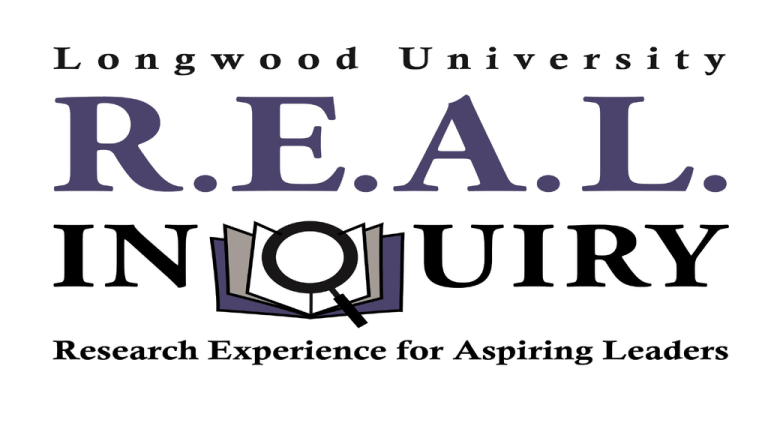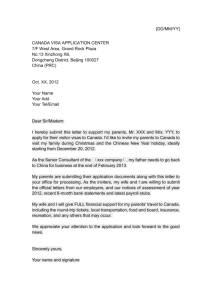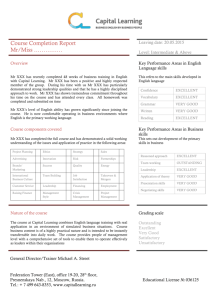Download / View the March 18 PowerPoint Presentation
advertisement

R.E.A.L. Inquiry • • • The undergraduate research initiative Longwood University has developed as its Quality Enhancement Plan Uses the development of research skills and the practice of research as a vehicle for improving students' critical thinking, information literacy, and communication skills. It embodies the university's mission and advances institutional priorities reflected in the Academic Strategic Plan • • • Provide a distinctive student experience through a focus on academic excellence and the development of 21st century citizen leaders Gain national recognition for the expertise of our faculty and staff in scholarship, pedagogy, and student research Support and promote academic programs that engage a wide range of diverse communities • • R.E.A.L. Inquiry Responds to the institutional assessment represented by the NSSE and core competency testing • Underscored the importance of introducing students to the possibility, practice, and importance of research • Relates directly to the CT and communication competencies that institutional assessment has shown to be less than optimal among Longwood undergraduate students Corresponds to the competencies employers prize and our society needs. • When survey respondents answered a question about the “degree to which various new approaches to learning have potential to help students succeed,” the development of research skills received the highest rating, one of 83% (AAC&U, p. 10) Process used to develop R.E.A.L. Inquiry • • 2011-12: Selected the topic of student research / academic inquiry with an explicit focus on core competencies • Outreach and presentations; surveys 2012-13: Developed a plan that would: • make a significant difference in students’ learning at multiple points in their time at Longwood • involve relevant constituencies in the development & implementation of the plan • align with established best practices for developing an undergrad research program Characteristic of Excellence in UR Element of QEP 1. Campus Mission and Culture QEP 2. Administrative Support Office of Student Research Faculty Reassigned Time Student travel grants 3. Research Infrastructure Resources 4. Faculty Professional Development opportunities Faculty development workshops Graduate student assistants 5. Recognition Awards for Excellence in Mentoring 6. External Funding Resources 7. Dissemination Student Travel Grants Annual Student Research Showcase Day Online student research portal 8. Student-centered issues Scaffolded curriculum 9. Curriculum Scaffolded curriculum 10. Summer Research Program Summer research program 11. Assessment activities Assessment 12. Strategic Planning Organizational Structure Process used to develop R.E.A.L. Inquiry • 2013-14: • writing of proposal • Naming contest / design element • http://www.longwood.edu/realinquiry • marketing efforts • social media, print, t-shirts, promotional products Desired Student Learning Outcomes • Students will exercise critical thinking in setting problems and conducting an inquiry • Students will demonstrate information literacy in finding, evaluating, and using sources and considering evidence • Students will communicate effectively in expressing results Student Outcome SLO-A: Students will exercise critical thinking in setting problems and conducting an inquiry. SLO-B: Students will demonstrate information literacy in finding, evaluating, and using sources and considering evidence. SLO-C: Students will communicate effectively in expressing results. Assessment Measures Implementation Direct: SCHEV Competency Assessment: Critical Thinking Testing each spring beginning in Year 3; results evaluated each fall Indirect: NSSE questions NSSE administered in 2014, 2016, 2018 OSR Student Survey Pre and post administered in QEP enhanced courses Direct: SCHEV Competency Assessment: Information Literacy Testing each spring beginning in Year 3; results evaluated each fall Indirect: NSSE questions NSSE administered in 2014, 2016, 2018 OSR Student Survey Pre and post administered in QEP enhanced courses Direct: SCHEV Competency Testing: Written Communication; Oral Communication Testing each spring beginning in Year 3; results evaluated each fall Indirect: NSSE questions OSR Student Survey NSSE administered in 2014, 2016, 2018 Pre and post administered in QEP enhanced courses Target Reported to “QEP students” will have results higher than “All students” OSR Director, Student Research Advisory Council and Provost “QEP students” will have results higher than “All students” OSR Director, Student Research Advisory Council and Provost “QEP students” will have results higher than “All students” OSR Director, Student Research Advisory Council and Provost Environmental Outcome Assessment Measures EO-A: Number of students presenting undergraduate research to the academic and civic communities will increase. Implementation Target Responsible Reported to The OSR Director will create a database to track the number of students who receive funding for travel to present their research and to track the number of students who apply and who present on the student research day. EO-B: Opportunities for The number of students who student participation in research research a research grant or who and creative activities on and participate in enhanced sections off campus will expand. of ENGL 150, mid-tier disciplinary courses, in mentored research courses, and in the summer research program will be tracked OSR will create a database that will track this information To be determined following baseline data collection in 2014-15 OSR Director Student Research Advisory Council and Provost OSR will create a database that will track yearly participation in faculty-supported research projects For the summer research program: 2013-2014: 14 students 2014-2015: 14 students 2015-2016: 28 students 2016-2017: 28 students 2017-2018: 28 students 2018-2019: 28 students OSR Director Student Research Advisory Council and Provost EO-C: Capacity of faculty members to mentor students and encourage their creativity will be enhanced. OSR will create a To be determined following OSR Director and Student Research database to track the baseline data collection in CAFÉ Director Advisory Council number of faculty who 2014-15 and Provost participate in CAFÉ’ and OSR sponsored research workshops and will formulate postworkshop surveys The number of CAFÉ’ and OSR sponsored research workshops The number of faculty members participating in CAFÉ’ and OSR sponsored research workshops and their responses to pre- and post-workshop surveys The amount of funding (stipends Environmental Outcome Assessment Measures Responsible Reported to EO-D: The curriculum will provide a scaffolded approach to student research skills development. The OSR Director will work with faculty to review syllabi of courses enhanced for research skills development to ensure a scaffolded approach to instruction and learning in this area. OSR Director Student Research Advisory Council and Provost EO-E: Faculty will have the skills and abilities needed for integrating research in instruction gained through participation in faculty development. The OSR Director will track the number of faculty members participating in research skills development workshops and will evaluate their responses to post-workshop surveys. The OSR Director will work with faculty to review syllabi of courses enhanced for research skills development to ensure a scaffolded approach to instruction and learning in this area. OSR Director Student Research Advisory Council and Provost EO-F: Undergraduate research and scholarly activities will be appropriately recognized in faculty evaluation and workloads. The OSR Director will establish a database to track the amount of funding going to stipends or reassigned time attributable to faculty members’ mentoring student research. The target will be set after a baseline is established in the first year of the QEP (2014-15). OSR Director Student Research Advisory Council and Provost The OSR Director will track the number of faculty members receiving awards for mentoring undergraduate research projects and will analyze the data for breadth of participation in areas such as academic discipline. GOAL 1: TO IMPROVE STUDENTS’ LEARNING BY PROMOTING THEIR DISCOVERY OF NEW KNOWLEDGE THROUGH RESEARCH 1.1 Identify or develop courses to be enhanced for research skills development and prepare faculty through development grants and workshops to offer these courses 1.2 Make available faculty-guided summer undergraduate research program in all disciplines Year 1: 2014-2015 Year 2: 2015-2016 Year 3: 2016-2017 Year 4: 2017-2018 Year 5: 2018-2019 1.1.1 Enhance ENGL 150 curriculum x xx xxx xxx xxx 1.1.2 Offer enhanced disciplinary research-focused courses x xx xxx xxx xxx x xx xxx xxx x xx xxx xxx x xx 1.1.3 Expand on R.E.A.L. Inquiry-associated individual mentored research courses 1.1 Roundtable sessions; Invite faculty to apply/attend the summer faculty development session 1.2 Offer expanded program, to be called Longwood University Summer Research Fund (LU-SRF) 1.2 Continue to expand participation in LU-SRF Prepare for and implement summer 2019 Poster sessions to highlight effective research models in Departments at LU x x x Impact of Goal 1 Year 2 (2015-16) Year 3 (2016-17) 8 sections each semester = 288 students 8 sections each semester = 288 students 8 sections each semester = 288 students 1.1.2: Other courses (assumes 20 students per section) 3 sections = 60 students 1.1.3: Senior Honors Research Program and Individual Mentored Research Actions for Goal 1 1.1.1: ENGL 150 (18 students per section) Year 0 (2013-14) 2 sections in spring semester = 36 students Year 1 (2014-15) Year 4 (2017-18) Year 5 (201819) Totals for Goal 1 8 sections each semester = 288 students 8 sections each semester = 288 students 1476 students 6 sections = 120 9 sections = students 180 students 12 sections = 240 students 12 sections = 240 students 840 students 18 students 24 students 30 students 36 students 36 students 144 students 1.2: Summer Research Program 14 students in PRISM 14 students in PRISM 14 students in PRISM 28 students (including 14 in PRISM) 28 students (including 14 in PRISM 28 students (including 14 in PRISM) 126 students Yearly subtotals 50 students 380 students 446 students 526 students 592 students 592 students 2576 students GOAL 2: TO IMPROVE STUDENTS’ LEARNING BY FACILITATING STUDENT-FACULTY COLLABORATION IN RESEARCH 2.1 Establish Office of Student Research (OSR) 2.2 Establish competitive funding for recognizing excellence in faculty mentoring of undergraduate research 2.3 Use electronic portal to draw attention to possibilities for undergraduate research and completed student research, to track students’ research skills development, and to assess core competencies addressed in the QEP Year 1: 2014-2015 Year 2: 2015-2016 Year 3: 2016-2017 Year 4: 2017-2018 Year 5: 2018-2019 2.1.1 Appoint OSR Director x 2.1.1 Work with relevant constituencies to build the Office of Student Research in an appropriate location x x x 2.1.2 Establish, maintain, update OSR website (i.e., link the OSR webpage to the Digital Commons) x x x x x 2.1.3 Develop and expand upon alignment with campus resources x xx xxx xxx xxx 2.2.2 Establish and provide annual Excellence in Mentoring Awards x xx xxx xxx xxx 2.2.3 Create and continue to offer funding for undergraduate research and travel grants x xx xxx xxx xxx 2.3 Implement surveys to track students’ research skills development x x x x x 2.3 Utilize Design Lab for maintaining student research portal x x x x x GOAL 3: TO IMPROVE STUDENTS’ LEARNING BY ADVANCING THEIR UNDERSTANDING OF THE IMPORTANCE OF DISSEMINATING THE RESULTS OF RESEARCH IN ACADEMIC AND CIVIC COMMUNITIES 3.1 Link undergraduate research and community engagement 3.2 Provide grants for undergraduate research and/or presentations at conferences 3.3 Organize annual student research showcase day for Longwood students 3.4 Highlight senior honors research program and other student research on the student research portal Year 1: 2014-2015 Year 2: 2015-2016 Year 3: 2016-2017 Year 4: 2017-2018 Year 5: 2018-2019 3.1 Develop and update website for community partners x x x x x 3.1 Explore and execute avenues for promoting community engagement in a scholarly manner x xx xxx xxx xxx 3.2 Establish and provide student travel funds and faculty travel / equipment grants x xx xxx xxx xxx 3.3 Invite faculty members to attend the first Longwood University Student Research Showcase Day (LUSRSD) x x xx xxx xxx xx xxx xxx xxx 3.3 Expand participation in LUSRSD to include all colleges and departments 3.4 Encourage student scholarship to be published on the Digital Commons x Provost Composition Coordinator Core Competency Team Leaders Graduate Assistants Director of Office of Student Research (OSR) Information Technology Unit, liaison Office of Assessment and Institutional Research Student Research Advisory Council •LU-PRISM, coordinator •Honor’s College, dean •Senior Honors Research Committee, chair •Center for Academic Faculty Enrichment (CAFÉ), director •Student representative •Library faculty/staff representative •Writing Center / Center for Academic Success representative •General Education program representative •College of Graduate and Professional Studies representative •Community Representative Collaboration with Existing Programs and Offices • Writing Center • Center for Academic Success • Greenwood Library • Office of Sponsored Programs and Research • Office of Assessment and Institutional Research • Office of Leadership and Service Learning Continuing funding for QEP activities Activity Year 1 (2014-15) Year 2 (2015-16) Year 3 (2016-17) Year 4 (2017-18) Year 5 (2018-19) Totals C-CCAS Undergraduate Research Fund $20,000 $20,000 $20,000 $20,000 $20,000 $100,000 C-CCAS Faculty Awards $2,000 $2,000 $2,000 $2,000 $2,000 $10,000 PRISM summer research program $175,000 $175,000 $175,000 $175,000 $175,000 $875,000 Assessment support (competency testing and NSSE administration) $12,000 $7,000 $12,000 $7,000 $7,000 $45,000 $209,000 $204,000 $209,000 $204,000 $204,000 $1,030,000 Totals Distribution of New Funds Academic Activities: • • • • • • • Summer workshops and teaching institute Roundtables Course enhancement LU-SRF Reassigned time and stipends Mentoring awards / research grants LUSRSD Admin Support: • • • • OSR director Graduate assistants CUR Institutional membership OSR budget Administrative support 39% Academic activities 61% Goal Strategy Goal 1: Discovery of new knowledge through research Summer workshop/teaching institute TOTALS Year 3 (2016-17) Year 4 (2017-18) Year 5 (2018-19) Totals $20,000 $4,500 $4,500 $4,500 $38,000 Roundtables ENGL 150 enhancement $1,000 $14,000 $1,000 $3,500 $1,000 $3,500 $1,000 $3,500 $1,000 $3,500 $5,000 $28,000 Disciplinary research-focused course enhancement $10,500 $10,500 $10,500 $10,500 $0 $42,000 $0 $0 $175,000 $175,000 $175,000 $525,000 Subtotal Student research director $30,000 $80,000 $35,000 $80,000 $194,500 $80,000 $194,500 $80,000 $184,000 $80,000 $638,000 $400,000 Graduate assistants CUR institutional membership $28,000 $2,000 $28,000 $2,000 $28,000 $2,000 $28,000 $2,000 $28,000 $2,000 $140,000 $10,000 Student research office budget $10,000 $10,000 $10,000 $10,000 $10,000 $50,000 Reassigned time or stipends $18,000 $24,000 $30,000 $36,000 $36,000 $144,000 $3,000 $10,000 $151,000 $10,000 $5,000 $5,000 $10,000 $159,000 $10,000 $5,000 $7,000 $10,000 $167,000 $10,000 $5,000 $8,000 $10,000 $174,000 $10,000 $5,000 $10,000 $10,000 $176,000 $10,000 $5,000 $33,000 $50,000 $827,000 $50,000 $25,000 $15,000 $15,000 $15,000 $15,000 $15,000 $75,000 $0 $1,000 $1,000 $1,000 $6,000 $9,000 $196,000 $210,000 $377,500 $384,500 $381,000 $1,549,000 Mentoring awards Research grants Subtotal Goal 3: Understanding of the Student travel importance of disseminating research to Annual student research showcase day academic and civic communities Subtotal Assessment support Year 2 (2015-16) $4,500 Expanded summer research program Goal 2: Student-Faculty collaboration in research Year 1 (2014-15) Syllabus review and additional NSSE administration Summary • The development of citizen leaders has been Longwood’s mission for over a decade. At the heart of citizen leadership is deliberate and systematic inquiry. • R.E.A.L. Inquiry is the process of research; a process that engages, exercises, and improves students’ skills in critical thinking, information literacy, and communication. • It will take advantage of the expertise of the outstanding faculty at Longwood while allowing students to develop a deeper understanding of their disciplines. Social Media • http://youtu.be/Q5w6XnuB84w • http://blogs.longwood.edu/buzz/?p=473&shareadraft=baba473 _52f511d7f00e9 • http://youtu.be/uLwx2c4nCvU

